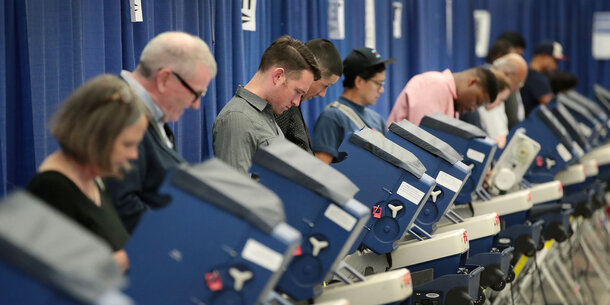State officials in a number of Republican-controlled states say they care about protecting our elections from voter fraud. But if you look at their actions, it appears they’re more interested in intimidating eligible voters and discouraging participation.
In Florida and Texas, there’s no evidence of widespread fraud. Unable to find a problem that doesn’t exist, officials in those states are now politicizing law enforcement so they can label honest mistakes as “voter fraud” — and scare eligible people from voting in the process. At the same time, officials in both states are taking steps that demonstrate their concerns about fraud are just a rhetorical fig leaf.
In Florida, Gov. Ron DeSantis (R) has bragged that his state’s election practices are the “gold standard.” Yet last year, he got state lawmakers to establish a highly unusual election police office because “people weren’t getting prosecuted” by local prosecutors. Since opening its doors last July, the Office of Election Crimes and Security has investigated more than 3,000 possible cases of alleged “election law violations or irregularities,” but only a tiny fraction have led to arrests. The vast majority were of people who were misled or confused about their eligibility to vote. Some local prosecutors have refused to bring charges under similar circumstances, so the election crimes office has teamed up with the Office of Statewide Prosecution, which is overseen by a DeSantis ally, Attorney General Ashley Moody (R). But several judges have said the statewide prosecutor lacks authority to prosecute individuals identified by Florida’s election police, prompting state lawmakers to pass a bill that expands their authority.
Florida’s election police fell flat and showcased the danger of politicizing law enforcement, yet Virginia, Ohio, and Georgia have each followed suit, either creating similar units or expanding the power of state criminal agencies to pursue election law violations. As with Florida’s, none of these entities have been able to root out any actual fraud, but Texas lawmakers are poised to create their own version.
In Texas, local prosecutors are charged with prosecuting election crimes, and the attorney general’s office already has two units dedicated to investigating them. Yet the Texas Senate just passed a bill that would empower the secretary of state to appoint “election marshals” to investigate election crimes and file criminal charges. Supporters of the bill say it’s a necessary means to keep elections safe and root out “fraud,” particularly in Texas’s larger counties. But state officials have said that Texas’s elections are safe and secure, and a postelection audit of the state’s four largest counties found no widespread fraud in the 2020 election.
At the same time, in line with a broader trend of criminalizing voting-related activity, officials in Florida and Texas are pursuing people with past felony convictions for good-faith mistakes at the ballot box.
The first act of Florida’s election crimes office was to arrest 20 people with past felony convictions for voting while ineligible. But those charged didn’t know they were ineligible. In fact, many, if not all, received a voter information card in the mail, which they thought meant they were authorized to vote. Florida lawmakers could have responded to the August arrests by fixing the issue that led to them — namely, the state’s maze of eligibility requirements for returning citizens. Instead, they approved an omnibus elections bill that adds a disclaimer to voter information cards providing they are “for informational purposes only” and not “legal verification” of one’s eligibility to vote. In other words, Florida has shifted more of the burden to its citizens to navigate the convoluted eligibility rules, even as the state has made clear that an honest mistake could send someone to prison.
Likewise, Texas’s senate passed a bill that would remove the requirement that prosecutors must prove that a person knew they were ineligible for them to be guilty of illegal voting. This bill, which would make it easier for confused people with felony convictions to be prosecuted, is a transparent attempt to get around a ruling by the Texas Court for Criminal Appeals in the case of Crystal Mason, who was sentenced to five years in prison after she mistakenly voted while on probation in 2016. Texas’s highest criminal court ordered Mason’s case to be reconsidered because the state did not prove that she knew she was ineligible but voted anyway.
While officials in Florida and Texas are going to great lengths to punish people with past convictions for honest mistakes, both states seem to have taken a different approach when it comes to pursuing or preventing other forms of alleged voter fraud.
When four white residents of a retirement community in Florida were charged with double voting last year, they were prosecuted by a local state attorney, as opposed to the politicized office of statewide prosecutor, without a peep from the governor. At least two of those individuals (both registered as Republicans) were also permitted to turn themselves in, and all four received plea deals that allowed them to avoid prosecution if they completed community service and passed an adult civics class. By stark contrast, none of the people with past convictions arrested last August — the majority of whom are Black — were allowed to turn themselves in. In fact, many were surprised and confused by their arrests, as shown by troubling body cam footage. Some were even handcuffed in their underwear by heavily armed SWAT teams.
To be clear, we aren’t advocating for harsher penalties across the board. But the comparatively cruel treatment of people with past convictions reveals the superficiality of the state’s supposed concern with fraud and suggests an intent to intimidate eligible voters.
This form of voter intimidation can be highly effective — and not just in the state where it’s occurring. It’s no surprise that qualified voters in Florida and Texas are scared to vote if they see others who believed they were eligible have their lives upended when that belief turns out to be mistaken. And after learning of Florida’s draconian prosecutions, even Alabamans with past felony convictions have said they’re no longer willing to risk jeopardizing their family by voting.
This intent to intimidate, masked by a false commitment to election integrity, is further underscored by Florida’s withdrawal — and Texas’s likely withdrawal —from the Electronic Registration Information Center. For more than a decade, this bipartisan consortium, also known as ERIC, has improved the accuracy of state voter rolls by sharing information among its member states. In 2019, DeSantis brought Florida into the partnership to “reduce the potential for voter fraud.” But after baseless attacks from the right, several states caved to the conspiracy theories and left the cooperative. Florida announced its withdrawal in March, and lawmakers in Texas are considering several bills to get out of the partnership, with the Texas GOP naming exiting the group a legislative priority.
Without the pretense of election integrity, the purpose behind Florida’s and Texas’s pursuit of honest mistakes is betrayed by its likely consequence: intimidating citizens with prior felony convictions from participating in elections. And those citizens are disproportionately Black. This true aim is instructive as we evaluate supposed efforts to unearth and punish “fraud” in other states.



